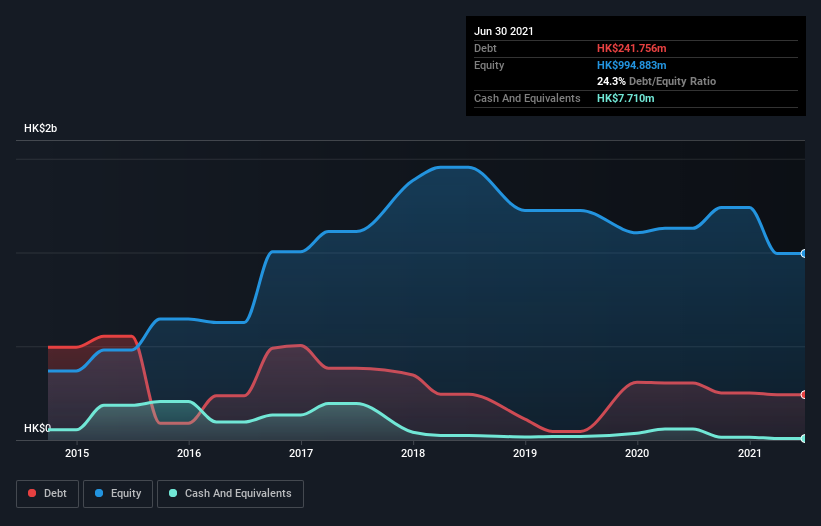
David Iben put it well when he said, 'Volatility is not a risk we care about. What we care about is avoiding the permanent loss of capital.' When we think about how risky a company is, we always like to look at its use of debt, since debt overload can lead to ruin. We note that Tesson Holdings Limited (HKG:1201) does have debt on its balance sheet. But the more important question is: how much risk is that debt creating?
When Is Debt A Problem?
Debt and other liabilities become risky for a business when it cannot easily fulfill those obligations, either with free cash flow or by raising capital at an attractive price. In the worst case scenario, a company can go bankrupt if it cannot pay its creditors. However, a more frequent (but still costly) occurrence is where a company must issue shares at bargain-basement prices, permanently diluting shareholders, just to shore up its balance sheet. By replacing dilution, though, debt can be an extremely good tool for businesses that need capital to invest in growth at high rates of return. The first step when considering a company's debt levels is to consider its cash and debt together.
View our latest analysis for Tesson Holdings
How Much Debt Does Tesson Holdings Carry?
As you can see below, Tesson Holdings had HK$241.8m of debt at June 2021, down from HK$304.6m a year prior. However, it also had HK$7.71m in cash, and so its net debt is HK$234.0m.

How Healthy Is Tesson Holdings' Balance Sheet?
We can see from the most recent balance sheet that Tesson Holdings had liabilities of HK$1.75b falling due within a year, and liabilities of HK$88.3m due beyond that. Offsetting this, it had HK$7.71m in cash and HK$493.2m in receivables that were due within 12 months. So it has liabilities totalling HK$1.33b more than its cash and near-term receivables, combined.
This deficit casts a shadow over the HK$618.2m company, like a colossus towering over mere mortals. So we definitely think shareholders need to watch this one closely. At the end of the day, Tesson Holdings would probably need a major re-capitalization if its creditors were to demand repayment. When analysing debt levels, the balance sheet is the obvious place to start. But it is Tesson Holdings's earnings that will influence how the balance sheet holds up in the future. So when considering debt, it's definitely worth looking at the earnings trend. Click here for an interactive snapshot.
In the last year Tesson Holdings had a loss before interest and tax, and actually shrunk its revenue by 4.2%, to HK$425m. We would much prefer see growth.
Caveat Emptor
Importantly, Tesson Holdings had an earnings before interest and tax (EBIT) loss over the last year. Its EBIT loss was a whopping HK$86m. Considering that alongside the liabilities mentioned above make us nervous about the company. We'd want to see some strong near-term improvements before getting too interested in the stock. Not least because it had negative free cash flow of HK$90m over the last twelve months. That means it's on the risky side of things. The balance sheet is clearly the area to focus on when you are analysing debt. But ultimately, every company can contain risks that exist outside of the balance sheet. We've identified 5 warning signs with Tesson Holdings (at least 2 which make us uncomfortable) , and understanding them should be part of your investment process.
At the end of the day, it's often better to focus on companies that are free from net debt. You can access our special list of such companies (all with a track record of profit growth). It's free.
Valuation is complex, but we're here to simplify it.
Discover if Tesson Holdings might be undervalued or overvalued with our detailed analysis, featuring fair value estimates, potential risks, dividends, insider trades, and its financial condition.
Access Free AnalysisThis article by Simply Wall St is general in nature. We provide commentary based on historical data and analyst forecasts only using an unbiased methodology and our articles are not intended to be financial advice. It does not constitute a recommendation to buy or sell any stock, and does not take account of your objectives, or your financial situation. We aim to bring you long-term focused analysis driven by fundamental data. Note that our analysis may not factor in the latest price-sensitive company announcements or qualitative material. Simply Wall St has no position in any stocks mentioned.
Have feedback on this article? Concerned about the content? Get in touch with us directly. Alternatively, email editorial-team (at) simplywallst.com.
About SEHK:1201
Tesson Holdings
An investment holding company, engages in the lithium ion motive battery business in the People's Republic of China.
Adequate balance sheet very low.
Market Insights
Community Narratives




